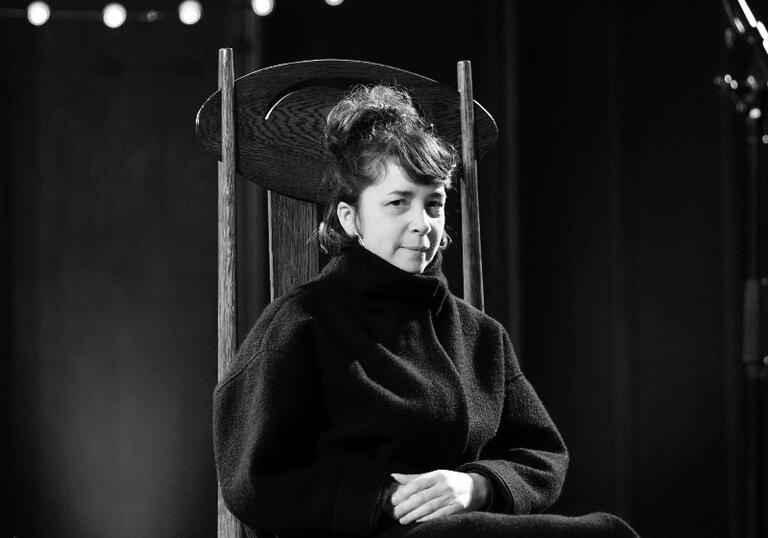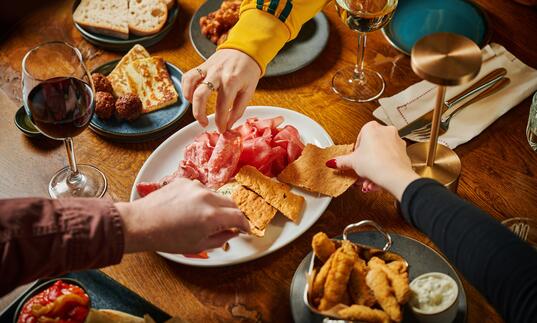Lisa O'Neill + Seamus Fogarty - Digital Programme

Following her 2018 collection Heard a Long Song Gone, The Wren in 2019 and an adaptation of Bob Dylan’s ‘All the Tired Horses’ for the final scene of TV drama Peaky Blinders, Lisa O’Neill’s latest album is entitled All of This Is Chance.
Long since noted as one of the most evocative singers and writers in contemporary Irish music, All of This Is Chance is a collection of new work that takes Lisa’s voice to greater heights, or depths, depending on which way you look at it.
Throughout all eight songs on this album, it feels like O’Neill is writing in a constant state of wonderment. Not only a portrait of the artist in love with nature, but one perplexed by the ever-expanding gulf between it and modern society. O’Neill sings across that divide while simultaneously digging deep into the land, eyes transfixed on a universe of colourful birds, and beyond them stargazing into the atomized constellations of outer space of which we ourselves are fragments. Rewind for a second.
In 2021 The Abbey Theatre invited Lisa to perform in their historic outdoor adaptation of Kavanagh’s tragic 1942 masterpiece ‘The Great Hunger’ on the grounds of the Irish Museum of Modern Art in Kilmainham. Particularly significant because it was one of Ireland’s first forays back into the live cultural arena as the arts continued to try and navigate the pandemic era. For Lisa O’Neill, though, it held even greater significance. The experience of immersing herself in and researching Kavanagh’s remarkable 6,000-word poem was part catalyst to make this new album unlocking a mutual fascination with themes around nature and creativity.
When reading Kavanagh, she was reminded of the speech of her mother’s townland, Crossdoney. In fact, it’s the words of Kavanagh himself and lines from ‘The Great Hunger’ that open this album on the title track: ‘Clay is the word and clay is the flesh/ Where the potato-gatherers like mechanized scarecrows move / Along the side-fall of the hill.’
‘It’s evocative, and there are so many parallels with this record,’ says Lisa of ‘The Great Hunger’. ‘I feel like Kavanagh’s poem was a prediction. 80 years on and look at our country, our values, our relationship with nature, tourism.’
The poem’s title obviously references the great famine of almost century earlier, but it’s more specifically themes of starvation of creativity, the absence of distraction, and stimulation as imposed on the farmers hopelessly bound to the land - a famine of imagination, as it were – that inspired Lisa to write perhaps her most ambitious song yet. When she annunciates Kavanagh’s refrain No cackle hen, horse neigh, tree sough, duck quack her voice snaps rhythmically summoning the monotonous rituals of rural toil yet, in a breath, O’Neill and her esteemed musicians present a world of possibility and wonder, ‘Man, walk on the moon / Eat with the stars / Try and touch the sun / burn burn burn.’ In the song’s final act, she summarises the mood with devastating accuracy, ‘Are you frightened of dying / Are ye frightened of the dead /Are you frightened of living / That you don't live instead.’
And it wasn’t just the opening song. Cinders of this spark with Kavanagh flicker throughout all eight songs. ‘I didn’t set out to do this but every song when you read through the lyrics of this album echoes aspects of the Great Hunger, which is odd but it’s a lovely discovery for me as well. I seem to have had similar struggles as he had, or thoughts, but from a female point of view, 80 years later. It’s very much about the oppression of the spirit, the oppression of the imagination and creativity within the rural people of Ireland under the pressure of the Catholic Church, and their relationship with themselves, and their place in the great story of nature.’
This song really is quite a bold opener, but it should be noted she has serious back-up. A revolving door of esteemed musicians come and go throughout the album including long-time collaborator on bass Joseph Doyle, Kerry concertina guru Cormac Begley, the cinematic genius of Colm Mac Con Iomaire, Kate Ellis of the Crash Ensemble, drummer Lorcan Byrne, producer Dave Odlum on guitar, as well as Colm O’Hara on trombone, Brian Leach on hammer dulcimer, Mic Geraghty on harmonium and David Coulter on saw. Lisa’s young niece, Sadie-Mae O’Neill supplies a precious additional voice on ‘Old Note’. The overall effect is controlled yet feral, tempestuous yet tender.
Metaphorically, O’Neill leans on nature continuously. On the song ‘Silver Seed’ a cavalcade birds, berries, bees, … tumble beautifully from her lips over a clacking banjo as Mac Con Iomaire weaves a heart-aching fiddle over her shoulder. On ‘Old Note’ he delivers a divine orchestral accompaniment to a sad lullaby which explores another interwoven theme of this collection, that being the wall between us and an intuition with nature we once had. The song was inspired by an interview with the great traditional musician Tony McMahon, and in its flow, you can feel Lisa inhaling all the gifts of nature she holds so dear. More stars! More birds! More devastating lines such as ‘Feathered friend, dig up and resurrect me / I long to live among the song of birdies / A lawless league of lonesome, lonesome beauty / Skies and skies and skies above duty.’
‘Birdy From Another Realm’ is another extraordinary composition. At this point it’s clear, and it’s obvious already throughout the songs leading up to it, on her fifth album Lisa O’Neill’s voice has found even greater depth and ability since we last heard from her in 2019. She is no longer taking her influences from other human singers… Now she’s taking universal cues from the ornithological universe (!), in all its cruelty, manipulation and empathy that mirrors our world. O’Neill beholds the iridescent peacock and warns us of the sly and mimicking cuckoo who can lay up to 40 eggs a year in the nests of unsuspecting other birds, her own voice transcending words into raspy witchy incantations as her musicians cling to a barely tonal psychedelic cacophony around her. ‘The relationship between the cuckoo and the warbler in Birdy is a metaphor for the narcissist and empath relationship which is so common in the human world,’ explains Lisa. ‘The playwright Eugene O’Neill often commented that he feels he was born without a skin, meaning that he believed he was hyper-sensitive from birth. All of this speaks to me. People have been writing about these things in their own way for years. I guess this album is my shot at it, and maybe every creation is… always trying to understand better this experience that is life.’
The mood is calmed by ‘The Globe’, a slow yearning vision of the outside world, once a blue and green map on her bedroom wall. If I Was a Painter was borne out of a panic-attack on the London Underground and the realisation of how fast technology is evolving, and the growing gulf between generations. Whist, ‘The Wild Workings of the Mind’ was written in response to the Frederick William Burton painting ‘The Meeting on the Turret Stairs’ and commissioned by the National Gallery of Ireland. The painting itself was the artist’s own response to the medieval Danish ballad Hildebrand and Hellelil. The song, inspired by the origin story of abandon and death fits well into the thematic framework of the album. It is at times a dramatic album, addressing wonder, fear the suppression of the spirt and the disconnect from the land. It requires a gentle touch to close out. ‘Goodnight World’ is a lullaby, simplified as if sung to a child, despite its darkness (Everyone I love lies under you tonight).
Produced by the Barbican
Details
Performers
Lisa O’Neill vocals, guitar, banjo, baritone guitar, harmonium, shruti box
Joseph Doyle double bass
Colm Mac Con Lomaire violin
Brian Leach hammer dulcimer
Mic Geraghty harmonium
Seamus Fogarty guitar, vocals
Emma Smith violin
Hall
Location
The Barbican Hall is located within the main Barbican building. Head to Level G and follow the signs to find your seating level.
Address
Barbican Centre
Silk Street, London
EC2Y 8DS
Public transport
The Barbican is widely accessible by bus, tube, train and by foot or bicycle. Plan your journey and find more route information in ‘Your Visit’ or book your car parking space in advance.
We’ve plenty of places for you to relax and replenish, from coffee and cake to wood-fired pizzas and full pre-theatre menus
Mobility
Spaces for wheelchair users in row U at the rear of the stalls (up to sixteen, depth of row 180cm) and the back row of the circle (four), both with fold-down companion seats. Some seats in row S of the stalls for people with very limited mobility.
Assistance dogs
Assistance dogs may be taken into the concert hall where there are a limited number of suitable seats in row G of the stalls. If you prefer, you may leave your dog with a member of the cloakroom staff during the performance.
Hearing facility
There is an induction loop in the concert hall. You can use this by adjusting your hearing aid to the ‘T’ setting.
Free large-print programmes
These are available for most of our concerts. Please contact [email protected] at least a week beforehand, to prebook a large-print programmme.
For more access information, please visit our Accessibility section.





